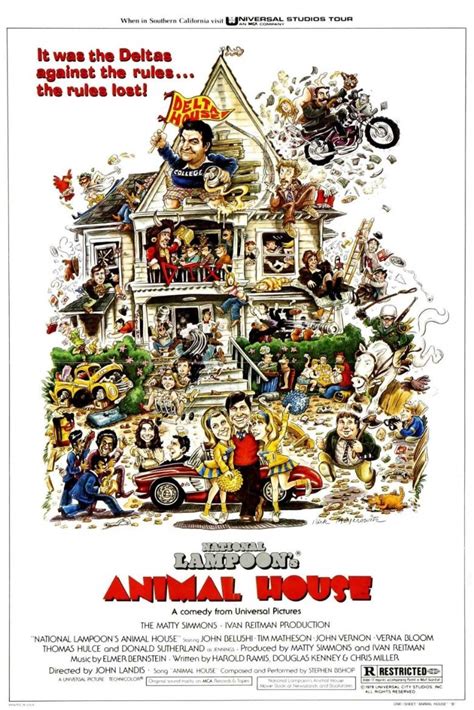National Lampoon's Animal House

Description:
National Lampoon's Animal House is a 1978 American comedy that follows the raucous Delta Tau Chi fraternity at Faber College as it flouts campus rules, wrecks social order, and unleashes pranks on rival fraternities and the administration. Led by outrageous Bluto Blutarsky, the misfit house storms through a semester of escalating chaos, raucous parties, and unlikely heroics, culminating in a riotous, iconic finale that reshaped college humor.Keywords:
Pub Crawl, Comedy, Slapstick, College ComedyWhat is the famous line from Animal House?
One of the most famous lines from "National Lampoon's Animal House" is "Toga! Toga!" This line is shouted during a memorable scene where the characters participate in a wild toga party, symbolizing the film's themes of rebellion and college life. The movie, released in 1978, is a comedy that follows the misadventures of a misfit fraternity at Faber College. Its irreverent humor and iconic moments have made it a classic in American cinema.
Who had a 0.0 GPA in Animal House?
In "National Lampoon's Animal House," the character who had a 0.0 GPA is Eric "Otter" Stratton, portrayed by Tim Matheson. He is one of the members of the Delta Tau Chi fraternity and is known for his charm and carefree attitude. The film humorously showcases the rebellious spirit of college life in the 1960s, and Otter's lack of academic success is emblematic of the fraternity's wild and carefree lifestyle.
How old was Kevin Bacon in Animal House?
Kevin Bacon was born on July 8, 1958, and "National Lampoon's Animal House" was released on July 28, 1978. This means he was 20 years old at the time of the film's release. Bacon played the character Chip Diller, contributing to the movie's comedic legacy as a classic college film.
Was the movie Animal House based on a true story?
Yes, "National Lampoon's Animal House" is inspired by true events. The film was influenced by the college experiences of writers Chris Miller and Doug Kenney at Dartmouth College, as well as their interactions with fraternity life. While the characters and specific plotlines are fictional, the chaos, humor, and themes of college life reflect real experiences from the 1960s. The movie captures the spirit of the era and the rebellious youth culture, but it is not a direct retelling of any specific true story.
Explore More Categories:
Social Justice Emotional Complexity Timing Plant Based Assassin Prehistoric Piranhas Nonfiction Arms Dealing Cosmology Subconscious Celebrity Obsession Reunion Anarchy Music Historical Thriller Family Expectations Segregation Arthurian Southeast Asia Groupthink Non Fiction Faith Based Gambling Misfortune 3d